Building a Jersey Future
The story of Ben and Allie King
By Pam Goodin
Rotherham, nestled just northwest of Christchurch and only a short drive from Hanmer Springs, is where Ben and Allie King are steadily carving out their place in the New Zealand dairy industry. As 50/50 sharemilkers running 660 cows, 45% of them Jerseys, the couple are not only building a farming business but also a lifestyle for their young family, while pushing forward the case for Jerseys in Canterbury.
The farm sits 180 metres above sea level, tucked in a basin where frosts linger and winters bite. Temperatures can drop to -10°C, though snow only settles briefly once or twice a season. The real challenge, however, comes in early spring, when groundwater sits close to the surface, creating wet conditions that can test even the most seasoned farmer. Yet the same high water table ensures good resilience through the hot, dry Canterbury summers. With 99% of the property irrigated—four centre pivots and a grid of pole sprinklers—the Kings can maintain strong pasture growth across their 170 effective hectares.
The Waiau River runs along the boundary, with seven to eight drains cutting across the property. The soils are heavy clays, which, while fertile, present limitations: two paddocks are so consistently wet that a fertiliser truck can only get on a couple of times per year. Ben and Allie are determined to address these challenges, with drainage projects in their long-term plans.
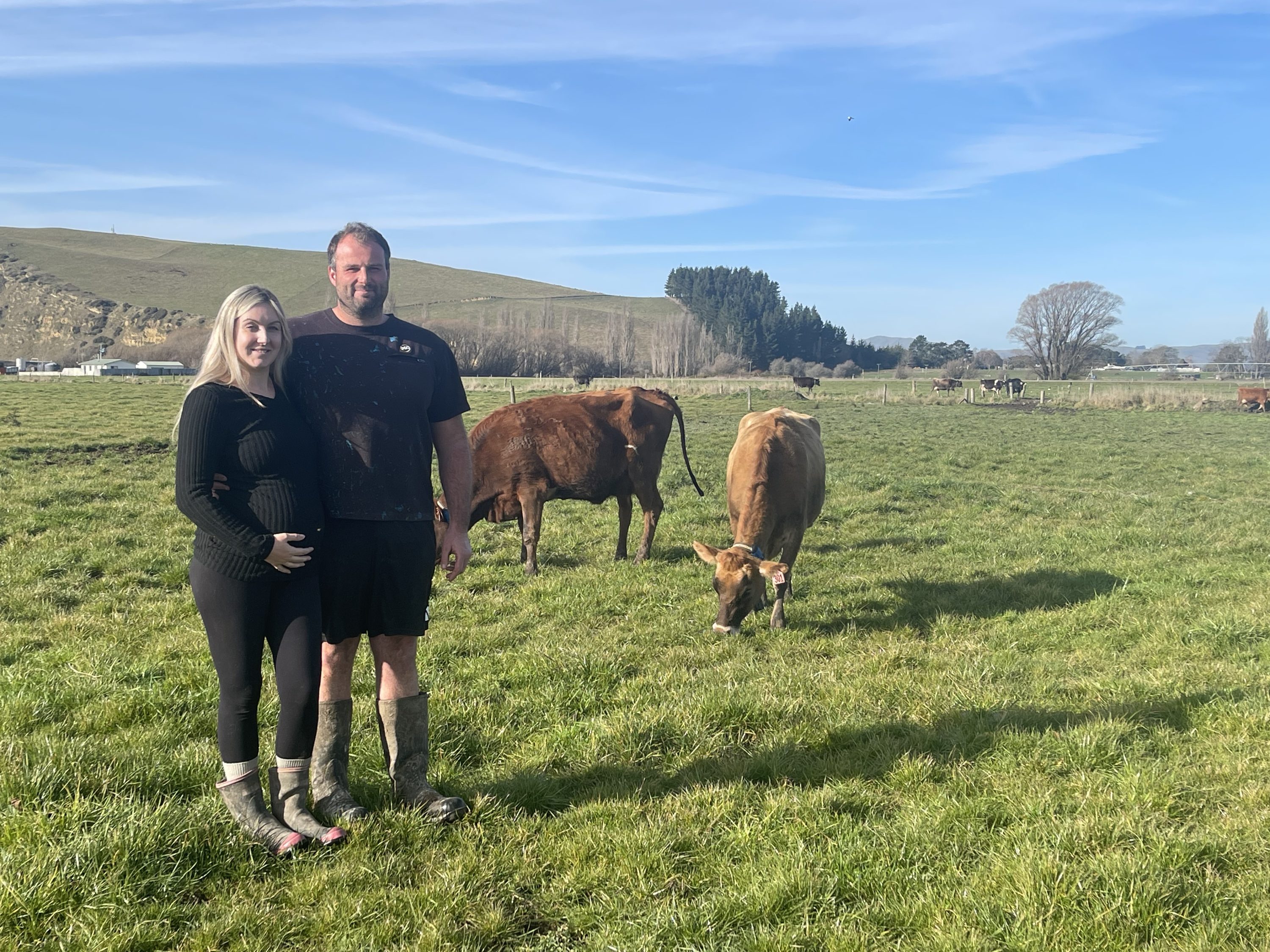
The couple’s farmhouse carries its own history, originally the local railway house it was built over 140 years ago when the railway ran through the farm. When Ben and Allie took over, much of the farm was rundown, overrun with bullrushes and in need of regrassing. But with the support of the farm owner, progress has been rapid. The dairy shed has been extended from 36 to 48-aside, in-shed feeding has been installed, protrack with draft gate added and Allflex collars now track the herd’s performance and health. The investments have delivered results: in their very first season, they achieved 317,000 kg milksolids with fewer cows and less land, far exceeding the farm’s previous record of 239,000 kg.
This past season, they produced 332,000 kg MS, and with another increase in cow numbers, they are budgeting for 350,000 kg MS this year. Their target is 520 kg MS per cow, with strong herd fertility helping them stay on track despite losses from disease and weather events at winter grazing.
The relationship with their farm owner is a pivotal part of their story. The owner has a 900 cow Friesian farm next door. Ben & Allie heard that this farm had sold, and reached out to the new owner to see if they were looking for a sharemilker. Things moved so quickly from there that the position was never advertised, and Ben & Allie’s first farm visit to view the land and houses was also the first for the new owner. The owner and Ben even extended the shed together, and the house is about to undergo extensive renovations. Recently, a smaller adjoining plot with a house and calf sheds has been purchased to extend Ben & Allie’s footprint.
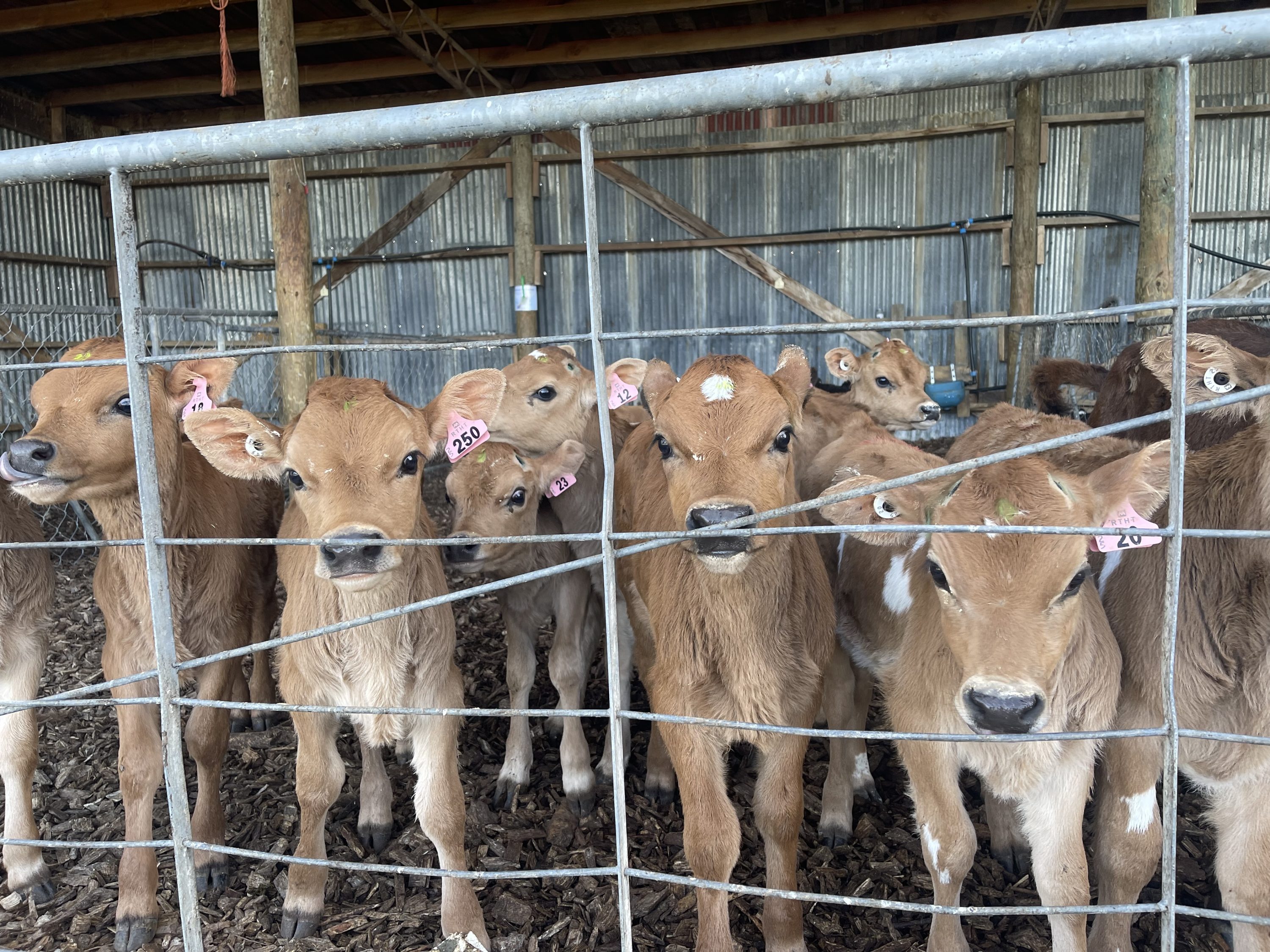
Ben & Allie graze the whole herd off farm over winter at Waipara. The young stock are grazed at Winchmore near Ashburton, with the in-calf heifers returning just before calving which starts on 22 July, followed by 30 July for the balance of the herd. Mating starts for the heifers on 14 October, and the cows 22 October. This season the intention is to blanket CIDr the heifers at grazing, and then use recorded bulls. The cows will get 6 weeks of AB mating followed by 4.5 weeks of SGL along with some Highland & Charolais straws.
For a while, Charolais and Speckle Park were the only real options for non-replacement calves in Canterbury in terms of sale value, with Ben feeling that Charolais cross certainly gives him more options. Their local market sees bull calves & surplus heifers purchased & reared by a local bank manager, and last season they only bobbied 140 mostly SGL and crossbred bulls out of over 600 calves born (with a 27% replacement rate). With the future in mind, their surplus stock have all been crossbred for the last three years – all Jerseys are retained as they grow their Jersey stake.
Ben grew up with farming in his blood, growing up in the Waikato and moving to Canterbury with his family at age 9. His maternal grandparents were third-generation Waikato farmers, and his parents came to farming later in life but themselves built up to 3,200 cows in Canterbury over nearly four decades. Ben’s entry into dairying wasn’t straightforward. After an early stint milking at 15 put him off, Ben pursued other work, becoming a stock agent in Christchurch. Farming called him back at 19, and he quickly climbed the ladder— from farm assistant to 2IC, then to managing large herds of up to 2,200 cows. Alongside him, Allie brought her own strengths. Christchurch-born and bred, she worked for Customs at Christchurch Airport before joining Ben in rural life. Later, her role at a farm supply store deepened her connection to the agricultural world.
Their paths intertwined at Kaikōura’s famous Seafest, and within a year, they had moved to Ashburton, bought their first house (which they barely got to live in), and embarked on their dairy journey together. Four years in Ashburton, a stint managing in Culverden, and now back in North Canterbury, the Kings have found a community and rhythm they love. With three-year-old Lincoln at their side (soon to turn four) and another baby due this spring, family is firmly at the heart of everything they do.
While their herd remains a mix with Jerseys making up nearly half, the Kings’ long-term vision is clear: a fully Jersey herd. Their breeding programme reflects this commitment, with 80% Jersey semen used across the herd and plans to gradually phase out crossbreds, all with future expansion in mind. The adaptability of Jerseys to their wet soils is another reason the breed fits their farm so well. Currently run as one herd, the cows will split onto a Jersey and crossbred herd as they move through calving with the crossbreds grazing on the drier side of the farm.
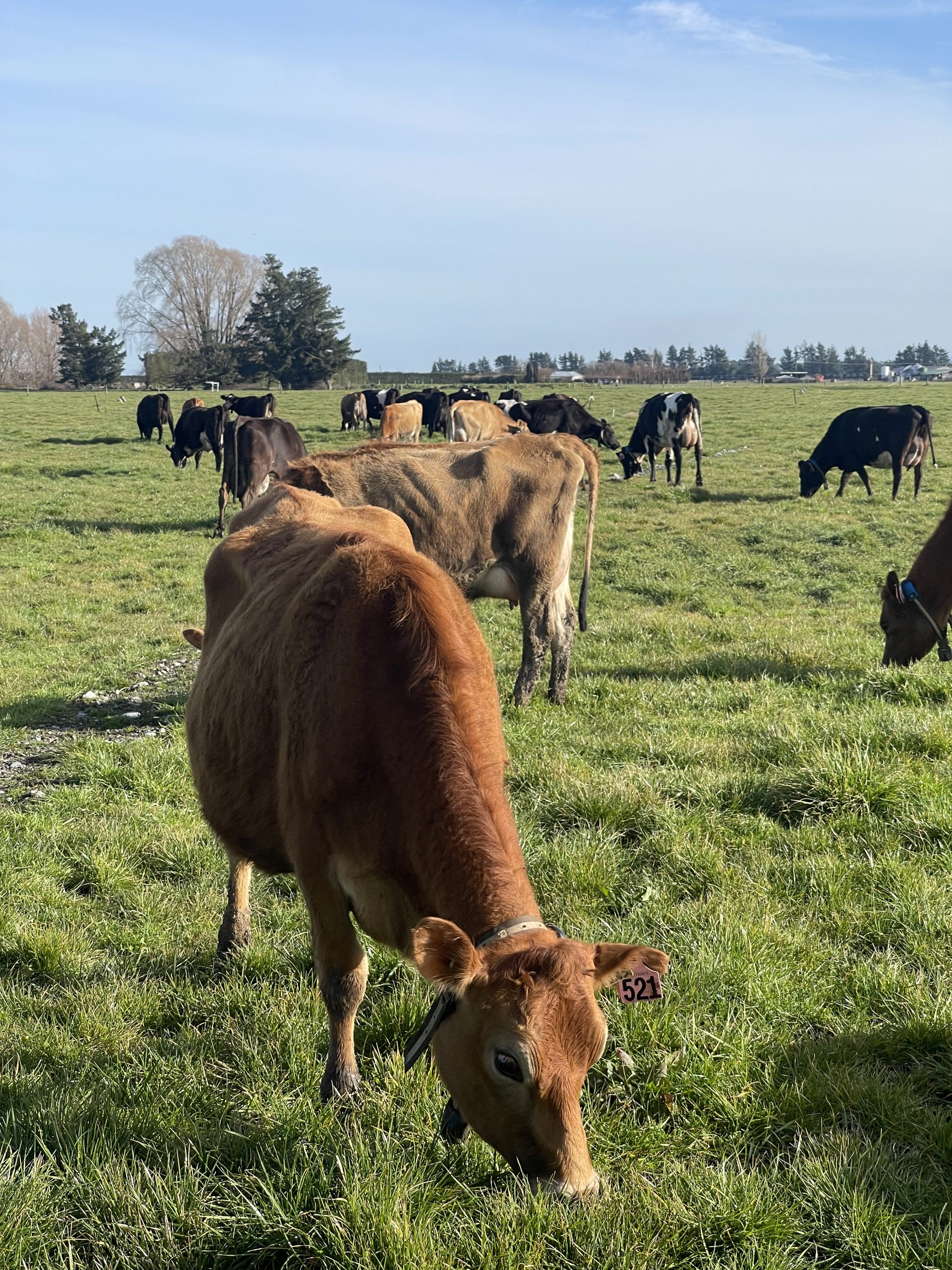
Ben is meticulous when it comes to breeding decisions. Semen is purchased from several different AB companies, with a strong emphasis on overseas sires to widen the genetic base. Australian Jerseys in particular have impressed him in recent years, with sires such as Brady, Roulette, and Impeccable offering both production and functional type. Canadian bulls like Monkees and Xenial are also in the mix, while New Zealand sires such as Berkly, Achievement, Guardsman, Kaka, and Sherlock continue to form part of his balanced programme. There is no ‘bull of the day’ used here, Ben carefully considers each nominated mating with bulls selected based on EBVs and cows drafted into groups before the AI tech arrives. With a complex mating plan, he tries to make the job as easy as possible for the AI tech with staff assistance.
Ben is also able to complete his own inseminations (usually with Allie’s help in loading the straws), and last year was able to provide cover for the local AI tech. Allie also helps out on farm with herd testing and young stock work and rearing calves, although all that is in abeyance during her pregnancy.
Berkly stands out in Ben’s mind as one of the most complete sires he has used. “Berkley has given us the balance of milk, fertility, and udder quality, without losing size,” he explains. Arkans Achievement has also been used heavily, though Ben is mindful of size, pairing him with crossbreds to maintain balance. He also uses sexed semen for about 15% of the herd, not as much as he has in the past. They were already generating too many replacements, and while they are rearing more replacements now to increase herd numbers, Ben as the primary calf rearer has a limit to how many he can rear.
Polled genetics are an area of growing interest for Ben. While he has only used one polled Jersey sire so far, the herd already has a good number of naturally polled animals, and he intends to build this trait into the herd where it doesn’t compromise other key priorities. “I want capacious, strong Jerseys with excellent udders and fertility. If they happen to be polled as well, that’s a bonus.”
Having used Jersey Future semen, Ben & Allie are expecting to have heifers TOP inspected alongside some older cows this season for the first time. Yet to nominate a bull calf for Jersey Future consideration, Ben feels that the herd may need another couple of years in terms of depth of pedigree, and he would like any nominations to be bulls that he is proud to have bred. Ben & Allie have cows contract mated now for several years with 35 this season, from both LIC and CRV and mostly on Jersey cows, although they have yet to have a bull purchased.
Their herd is fully DNA parentage verified, with genomic data helping to shape future decisions. Embryo transfer work is also part of their toolkit, with four to five cows flushed each year based on both type and production. Notably, they have calves on the ground from Ferdon Victorious Shirlee through ET partnership with the Gilbert (Glenalla) family. In terms of cow families, they have invested in bloodlines from respected herds such as Denson Dale, Posterity, Bells, Glenalla and Snowfed. Their herd was built from the purchase of cows from two Waikite Valley (Bay of Plenty) herds. Many of these animals are now the backbone of their Jersey breeding programme.
“All cows must be structurally sound,” Ben says. “I don’t want small Jerseys—I want capacious, strong cows that can handle this system.” Fertility and liveweight remain non-negotiables, and cows with excellent udders and liveweight BVs above -30 are at the top of his priority list.
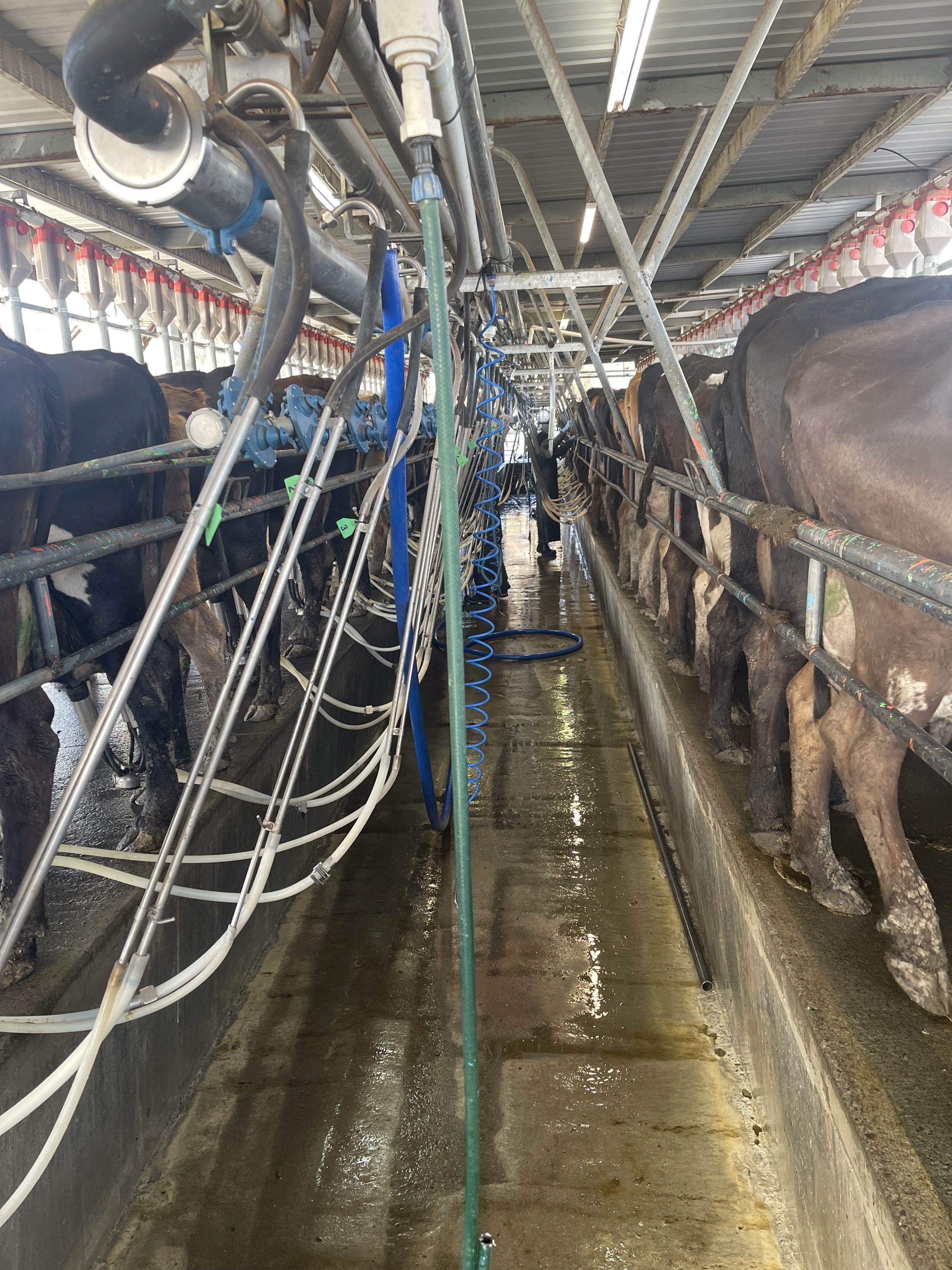
Efficiency is central to the Kings’ system, and Ben’s philosophy is to drive milk with supplement. They grow around 150 tonnes of silage annually, mainly fed out during the spring period, with some also in April/May. A consistent shed blend of palm kernel, DDG, and wheat underpins milk production through the season. The mix is adjusted as lactation progresses, ensuring protein and energy needs are met and depending on grass availability. Utilisation of feed via in-shed feeding is also significantly better than feeding silage on wet paddocks. This attention to detail pays dividends: last season they were still producing 2 kg of milksolids per cow well into late summer.
With Allflex collars and Protrack technology, herd management has become easier, reducing their reliance on relief staff. Their reproductive results speak for themselves: for the past two years, the six-week in-calf rate has exceeded 80%.
The farm operates as a true team effort. Two full-time staff, both recruited through the Filipino community, provide stability, and the Kings are committed to giving them at least two hours off during the day and they are usually on a 5/2 roster year round. Word of mouth also helps with finding relief staff as needed, and providing work experience opportunities. Staff development and well-being are non-negotiable priorities. One staff member has followed them across three farms, reflecting the loyalty they inspire. Ben comments “I love the cows, but I also really enjoy the people side of the business.” He looks forward to employing more good people and helping them progress through the industry.
Both Ben and Allie are actively involved in the wider Jersey community. Allie has previously contributed time to Jersey Advantage, helping to promote the breed through social media and marketing, while Ben (who was also involved in the Jersey Advantage commercial work group) has recently joined the JerseyNZ Jersey Future working group, advocating for the breed’s commercial potential. While he admits he’s less focused on the environmental side of the debate, Ben is determined to ensure Jerseys are positioned for growth in New Zealand’s competitive dairy industry.
Their dedication is already being recognised. They’ve purchased pedigree Jerseys from leading breeders and continue to explore sale opportunities such as the Jersey Pride and Ashvale dispersal sales. Ben’s enthusiasm is so strong that Allie jokes she may need to cancel his Bidr account to stop him from over-investing in genetics.
Rotherham offers more than just a good farming base. Its proximity to Hanmer Springs provides the Kings with access to outdoor pursuits, from skiing at Mt Lyford to hiking, biking, hunting, and salmon or trout fishing. Kaikōura is just over an hour away, and Christchurch is within reach for family connections. While farming is their full-time commitment, the location also supports balance and lifestyle—something Allie particularly appreciates.
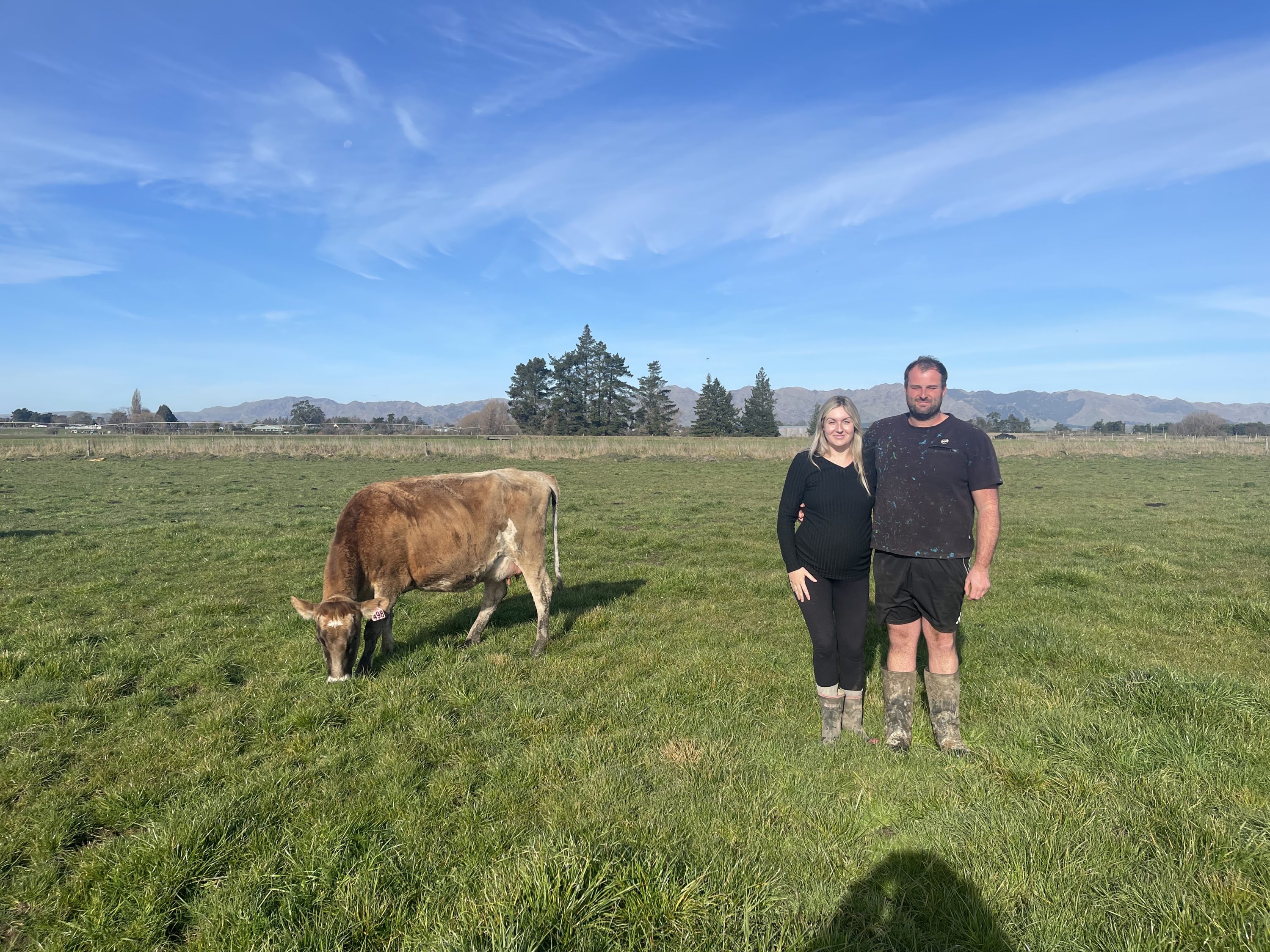
Having struggled with isolation during an earlier stint in Culverden, she now finds the region rich in friendships and support networks. The return to North Canterbury coincided with becoming parents, and the family element has helped strengthen their sense of belonging. For Allie, balance comes in the form of community and connection—through Dairy Women’s Network, Jersey Advantage, and their growing circle of friends in the region. “When we first came here, it was hard,” she admits. “But now, I’d hate to leave.”
Future plans for the Kings are ambitious but grounded. They hope to continue growing with their current farm owner with expansion a strong possibility. Farm ownership remains a question mark – while attractive, the reality of year-round commitment weighs heavily and the current ROI on sharemilking remains attractive. For now, their focus remains on running a high-performing herd, raising their family, and supporting their staff.
As Ben reflects: “Some days are tough, but I enjoy being busy and building a future for the family. It’s short-term pain for long-term gain.”
Together, Ben and Allie King embody the next generation of Jersey breeders in New Zealand— practical, ambitious, and deeply committed to the breed they believe in. Their story is one of persistence and vision: helping to reclaim a rundown farm, building a high-performing herd, and investing in genetics and people with equal determination. Their Jerseys are not just part of the herd; they are the cornerstone of a future they are determined to build. And as the couple continues to grow their business, expand their family, and champion the Jersey breed, there is little doubt that their influence will extend far beyond Rotherham.
